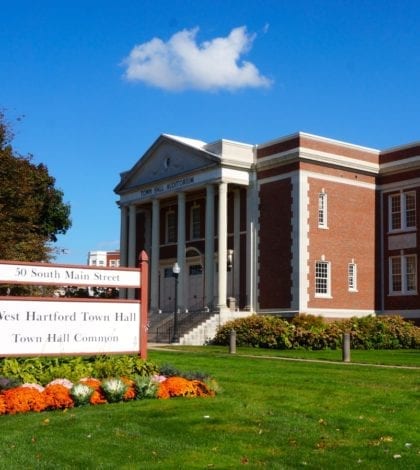West Hartford Chief Financial Officer Recommends Action to Maintain Credit Rating

Audio By Carbonatix

West Hartford Town Hall. Photo credit: Ronni Newton
West Hartford CFO Peter Privitera gave a report to the Town Council’s Finance and Budget Committee, recommending use of existing surplus to bolster the town’s fund balance and use of other revenues to offset pension liabilities, and the full Town Council will vote on both measures in December.
By Ronni Newton
The Town of West Hartford has surplus remaining from FY2017, and Chief Financial Officer Peter Privitera recommended to the Town Council’s Finance and Budget Committee last week that the money be used to stabilize the town’s General Fund balance.
Privitera also recommended increasing the motor vehicle mill rate from 32 mills to 37 mills, and using that revenue to reduce unfunded pension liabilities.
The Town Council is expected to vote on both resolutions at its Dec. 12 meeting.
The FY2017 surplus is $3.2 million, Privitera said Friday, and his recommendation is that it be used to increase the town’s fund balance ratio from the existing 8.1 percent to 9 percent. The surplus funds had initially been set aside in case the town needed them for its liabilities to the MDC in the event the City of Hartford defaulted on its obligations, and to guard against deeper cuts in state aid than could be handled within the existing budget, Privitera said.
When the Town Council passed the FY2018 budget in April, $7 million was placed in contingency for a reduction of state aid. The legislature finally passed a budget on Oct. 26, and even after the governor slashed an additional $2.2 million from West Hartford’s aid on Nov. 17, the contingency is enough to cover the shortfall, which according to Privitera now totals $6.9 million.
Using the surplus to add to the fund balance is important to preserve the town’s top bond rating, Privitera said. “Moody’s had commented that our ratio is much lower than other peer communities,” he said. That comment came in Moody’s Investor Services amendment of the town’s credit from “Aaa ‘stable'” to “Aaa ‘negative watch'” on Oct. 16, amid the state’s continued budget impasse.
Privitera said that the negative watch is “usually the first step in a possible credit downgrade,” and Moody’s cited the town’s reliance on state aid as a concern. While he is optimistic that the adoption of a state budget will lead Moody’s to revise its outlook for West Hartford back to “stable,” Privitera said that most communities in the state that maintain a triple-A rating have a double digit fund balance.
The town plans to sell bonds in January 2018, and the rating will have an impact on the cost of those bonds. The town will have discussions with both Moody’s and Standard & Poors prior to the sale, but Privitera warned in his report to the Finance and Budget Committee that a downgrade by Moody’s, should it occur, could result in an increased interest rate of 10 to 15 basis points.
In addition, assuring the top rating is maintained has other “ancillary benefits,” Privitera said, as an indication that the town is well managed, which helps attract commercial investors as well as homebuyers.
“We have to strategize on how to stabilize our longterm reserves and preserve our triple-A bond rating,” Mayor Shari Cantor said Friday. In advance of the town’s bond offering in January, this move will be part of the discussion with the credit rating agencies, she said.
Minority Leader Chris Barnes said Tuesday that he agrees with the plan to use the FY2017 surplus to bolster the fund balance and will support that resolution.
“We’re taking steps we feel are necessary to ensure our credit rating – which equates to lower borrowing costs – and translates to better economic development,” said Privitera. That development in turn will help the town continue to build up its Grand List and stabilize its tax rate.
Privitera also recommended to the Finance and Budget Committee last week that the town issue a supplemental motor vehicle tax bill to residents. Motor vehicle tax bills were mailed on Oct. 6 at a rate of 32 mills, but if the Town Council approves the recommendation the mill rate will be set at 37 mills.
The state budget that had been under consideration when the town adopted its FY2018 budget capped the motor vehicle tax rate at 32 mills, but also included an offsetting grant of $2.5 million to the town to make up for the lost revenue. The budget ultimately passed allows for a motor vehicle mill rate of up to 39 mills to be charged, but there is no offset grant.
“The 37 mills is consistent with last year,” Privitera said of his recommendation that a supplemental bill be issued. The supplemental bill will generate an additional $2.3 million in revenues, which he recommends be added to the town’s pension fund so that the discount rate – the assumed rate of investment asset growth – can be reduced from 7.5 percent to 7.25 percent.
The town’s Pension Board has had a goal of reducing the discount rate for several years, and ultimately hopes to get it as close as possible to the state’s average discount rate of 7 percent, Privitera said. Keeping the rate at 7.5 percent puts the town in the “treading water” category with respect to its funding of longterm liabilities according to Moody’s criteria, Privitera wrote in his report to the Finance and Budget Committee.
“Our financial advisors and our actuaries are telling us that our average rate of return is in the high 6s or 7 percent, so the pension unfunded liabilities are increasing,” Privitera said. Depositing the extra funds will put the town closer to where it should be in dealing with liabilities to which it is obligated based on past contracts.
Cantor said that obligations under old agreements have left the town in a difficult situation, and although newer employees have contracts that create much more stability for the town, the existing longterm liabilities must be met. The decisions being made are based on the recommendation of the town’s financial advisor, she said.
If approved by the Town Council on Dec. 12, the supplemental motor vehicle tax bills will be sent out in January, along with the supplemental bills typically sent to residents who added or changed vehicles after the Grand List was calculated.
“The two things, bolstering the fund balance and lowering the discount rate are both positive steps. We have been put on notice and we can’t ignore that,” Barnes said.
While he agrees with need for the lowering of the discount rate, Barnes said he just learned last week of the proposal to use a supplemental motor vehicle tax to fund it and is still digesting that information. “I agree it’s important, but I’m just not sure how I feel about a supplemental car tax,” Barnes said. He said he had hoped not to go back to taxpayers.
Town staff is already at work on the FY2019 budget, and it is sure to be another difficult year, Barnes said.
Privitera said that next year’s budget will likely see a return to a uniform mill rate.
Currently it appears that the town is running a surplus of approximately $1.6 million in FY2018, Privitera said, an amount that he recommends keeping set aside. The surplus is the result of approximately $1 million savings in the new trash contract and payroll savings from not filling vacant positions. It also includes a percentage of each department’s budget that Town Manager Matt Hart had asked be set aside due to overall budget uncertainty. The town manager will be meeting with department directors to determine how much of that money can remain set aside without impacting operations, Privitera said.
Privitera is hopeful that the FY2018 surplus can be used to further add to the fund balance, to offset pension liabilities, or to establish a tax rate stabilization fund.
Like what you see here? Click here to subscribe to We-Ha’s newsletter so you’ll always be in the know about what’s happening in West Hartford!




[…] reduce the discount rate from 7.5 percent to 7.25 percent and incorporate a new mortality table – measures that, along with bolstering the fund balance ratio, have been recommended in order to maint…. In October, Moody’s Investment Services amended West Hartford’s credit outlook from […]
[…] actions by the town – adding $3.2 million to the unrestricted fund balance and reducing the discount rate for the calculat… were seen as positive moves by the rating agencies, he said, by Moody’s still has concerns […]